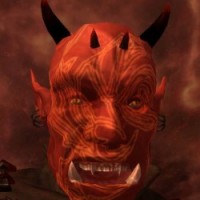
Mehrunes Dagon
CBUB Wins: 0
CBUB Losses: 0
CBUB Ties: 0
Win Percentage: 0%
Added by: donnyschellekens
Read more about Mehrunes Dagon at: Wikipedia
Official Site: Bethesda Softworks
The Elder Scrolls IV: Oblivion is an action role-playing open world video game developed by Bethesda Game Studios and published by Bethesda Softworks and the Take-Two Interactive subsidiary 2K Games. It is the fourth installment in The Elder Scrolls action fantasy video game series, following The Elder Scrolls III: Morrowind. Oblivion was first released in March 2006 for Microsoft Windows and Xbox 360. A PlayStation 3 (PS3) version shipped in March 2007 in North America, and in April 2007 in Europe and Australia. After a number of smaller content releases, a major expansion pack—Shivering Isles—was distributed. The Elder Scrolls IV: Oblivion Game of the Year Edition—a package including both Shivering Isles and the official plug-in Knights of the Nine—was released in September 2007 for Microsoft Windows, Xbox 360, and PlayStation 3, and on Steam in June 2009. A fifth anniversary edition was shipped in North America in July 2011 and in Australia in September 2011. Versions for other regions have been confirmed, although release details are unannounced.
Oblivion s main story revolves around the player character's efforts to thwart a fanatical cult known as "The Mythic Dawn" that plans to open the gates to a realm called "Oblivion". The game continues the open-world tradition of its predecessors by allowing the player to travel anywhere in the game world at any time and to ignore or postpone the main storyline indefinitely. A perpetual objective for players is to improve their character's skills, which are numerical representations of certain abilities. Seven skills are selected early in the game as major skills, with the remainder termed minor. Developers opted for tighter pacing and greater plot focus than in past titles.
Oblivion is an action role-playing game (RPG) that incorporates open-ended gameplay. The main quest can be postponed or ignored for as long as the player wishes to explore the expansive game world, follow side-quests, interact with NPCs, slay monsters and develop their character. The player is free to go anywhere in the realm of Cyrodiil at any time while playing the game, even after completing the main quest. The game never ends, and the player may build up the character indefinitely. The fast-travel system used in Arena and Daggerfall makes a return in Oblivion. When the player visits a location, it appears as an icon on the game world map. From then on, the player can travel to this location instantly if they are outside and not in combat, though the in-game time is adjusted to reflect the length of the journey. The game regards the player to be in combat when a hostile creature or NPC is near the player, regardless of whether or not the player is aware of the creature or vice-versa.
Character development is a primary element of Oblivion. At the beginning of the game, the player selects one of many human or anthropomorphic races, each of which has different natural abilities, and customizes their character's appearance. A perpetual objective for players is to improve their character's skills, which are numerical representations of their ability in certain areas. Seven skills are selected early in the game as major skills, with the remainder termed minor. The player levels up each time they improve their major skills by a total of ten points; this provides the opportunity to improve their attributes. Attributes are more broad character qualities, such as "strength" and "willpower", while skills are more specific, such as "blade" or "destruction" magic. The game rewards the player with "perks" when the player reaches either 25, 50, 75 or 100 points in a single skill. The game's 21 skills fall evenly under the categories of combat, magic, and stealth. Combat skills are used primarily for battle and incorporate armor and heavy weapons like blades, axes, maces, and hammers. Magic skills rely on the use of spell to alter the physical world, to affect the minds of others, to injure and debilitate enemies, to summon monsters to help fight, and to heal wounds. Stealth skills allow the player to crack locks, haggle for goods, use speech to manipulate people, and apply cunning in combat (through the use of a bow or with a sneak attack). The spells, weapons, and other tools such as lockpick that a player needs to employ and enhance these skills can be purchased in shops, stolen from NPCs, or found as loot on the bodies of foes or in dungeons.
CBUB Match Record:
No Regular Play Records Available
No Fantasy Draft Records Available
